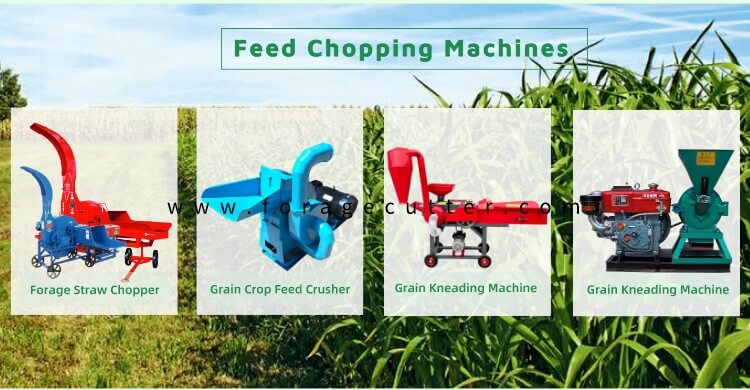Selecting the appropriate type of feed-chopping machine is critical for livestock farming. Choosing the wrong machine can lead to poor feed quality, animal health issues, and reduced efficiency. Therefore, it is important to consider several factors when deciding which machine to use for your operation, such as the type of feed, the size of your herd, and your budget. By carefully evaluating these factors and selecting the most suitable machine for your needs, you can ensure that your animals receive high-quality feed and that your operation runs efficiently and effectively.
Understanding the Different Types of Feed Chopping Machines:
Some common types of Feed Chopping Machines include Forage Straw Choppers, Grain Crop Feed Crushers, Grain Kneading Machines, and Maize Mill Machines. Forage Straw Choppers are ideal for chopping down corn, grass, hay, corn stalk, and squeezed sugar cane, while Grain Crop Feed Crushers are designed to crush cotton stalks, alfalfa, peanuts shell, and foodstuffs. Grain Kneading Machines are suitable for cutting all kinds of plant material, various kinds of green, dry corn straw, and rice straw, and Maize Mill Machines are used for grinding grains like Fruit Shells, herbs, bark, leaves, wheat bran, for feeding livestock. Each type of chopper has its own unique features and benefits, and choosing the right one for your livestock operation depends on your specific needs and the type of feed you plan to chop. It’s essential to carefully evaluate each option and consider factors such as capacity, horsepower, and cost before making a decision. Additionally, it’s important to consider the level of maintenance required for each type of machine and ensure that you have the resources and expertise to properly maintain and repair it as needed.
Considerations for choosing the right type of feed-chopping machine:
When it comes to selecting the right feed-chopping machine for your livestock operation, there are several factors that need to be taken into account. One of the primary considerations is the type of livestock that you have. Different types of livestock have varying feed requirements, and therefore, different types of feed choppers may be needed to meet their needs. For example, cattle may require a machine that can handle large quantities of hay or silage, while small ruminants such as sheep or goats may require a machine that can produce finer feed.
Another important factor to consider is the type of feed material that you will be processing. Some machines may be better suited for certain types of feed material, such as forage choppers for processing fresh forage crops, while others may be more suitable for processing dry materials such as straw or hay.
The quantity of feed that needs to be processed is another important consideration. If you have a large operation that requires a high volume of feed to be processed, you may need to invest in a machine with a higher capacity. On the other hand, if you have a smaller operation, a smaller machine may be sufficient.
The desired feed size is also an important factor to consider. Different types of machines produce different feed sizes, and the size of the feed can impact the digestibility and nutritional value of the feed.
Finally, it is important to consider your budget when selecting a feed-chopping machine. Different types of machines can vary significantly in price, and it is important to choose a machine that meets your needs without breaking the bank.
Features to look for in a feed chopping machine:
When selecting a feed chopper, there are several key features to keep in mind. First and foremost is the size and capacity of the machine. You want to ensure that the chopper is large enough to handle the volume of feed that you require and that it can process it efficiently. If you have a larger livestock operation, you may need to consider a commercial-grade machine that can handle heavy-duty workloads.
The type and quality of the blades are also important considerations. Different types of blades are suited for different types of feed materials, and you want to make sure that the blades are sharp and durable enough to handle frequent use without becoming dull or dam
Maintenance and support:
Selecting the right type of machine is only the first step in ensuring effective feed processing. Regular maintenance and support are also essential to ensure optimal performance and longevity of the machine.
Regular maintenance of the feed chopper is necessary to keep it in good working condition and prevent breakdowns that could lead to downtime and lost productivity. This includes regular cleaning, lubrication, and blade sharpening. It is also important to have the machine inspected periodically by a qualified technician to identify any potential issues before they escalate into more serious problems.
In addition to maintenance, support is also critical in ensuring the long-term performance of the machine. This includes access to replacement parts, technical support, and repair services when needed. Choosing a reputable manufacturer with a strong support network can help ensure that any issues that arise with the feed chopper can be addressed quickly and effectively.
GOLDEN MACHINERY COMPANY provides technical support and fittings for life. After-sales service isn’t restricted by time and we will solve your problems in time. If you are caught in some problems when using our products, welcome to contact us at any time. https://foragecutter.com/contact/
By investing in these critical aspects of machine management, livestock operations can maximize their efficiency and productivity, while also minimizing the risk of costly breakdowns and downtime.
Overall, selecting the appropriate feed chopper can lead to improved efficiency and effectiveness in livestock operations, resulting in better animal nutrition and health, and ultimately, increased profitability for the farmer.







